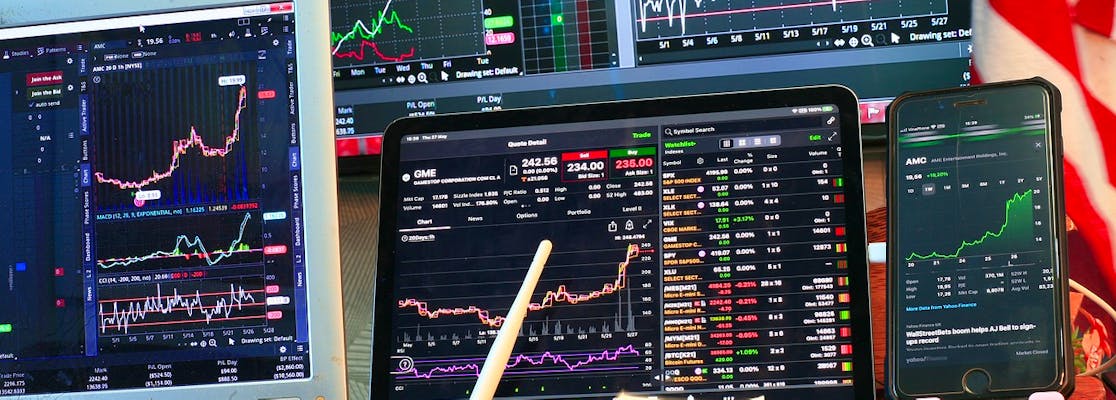5 Day Trading Strategies for Beginners
All products and services featured are independently selected by WikiJob. When you register or purchase through links on this page, we may earn a commission.
Day trading, where you buy and sell financial instruments on the same day, can be a great way of profiting from short-term price fluctuations.
Day traders will buy assets such as currencies, stocks, and options and then sell them before the stock market closes. This strategy allows traders to take advantage of small movements in the market.
If you are considering starting day trading, it is important you understand how it works. In this guide you will learn all you need to know about day trading so you can begin investing with confidence.
Leverage can boost profits but also magnify losses, potentially exceeding your initial investment. Always weigh the risks carefully.
Top Day Trading Brokers for 2025
Before you start day trading, you will need to choose a broker that meets your investing needs.
The brokers listed below are great options to launch your day trading journey.
1. Plus500
Pros
- Regulated by the Financial Conduct Authority
- Over 2,500 significant financial instruments (CFDs)
- Negative balance protection
- 24/7 customer support
Cons
- No API integrations
- No social copy trading
- Scalping is not offered on the Plus500 platform.
Key Features: No commission, CFD trading, demo account and real-time charts
Plus500 currently offers three platforms:
- Plus500CFD, featuring over 2,800 CFD instruments
- Plus500Invest, providing access to more than 2,700 shares (available in select countries)
- Plus500Futures, which is exclusively available in the US
Plus500 is a top online broker tailored to beginners in day trading, offering a user-friendly platform with commission-free trading and competitive spreads. It provides access to a wide range of assets ideal for day trading, including stocks, forex, and commodities.
Beginners must use the demo account and the Trading academy to gain experience before trading with real capital due to the risks involved.
The platform includes essential day trading tools like advanced charts, customizable technical indicators, and real-time market data to help traders analyze trends and execute precise trades. Features such as a demo account allow beginners to practice trading strategies without risking real money, while risk management tools like stop-loss and take-profit orders help mitigate potential losses.
Plus500 also offers leverage options, enabling traders to amplify their positions, though it’s important for beginners to use this feature cautiously. Regulated in multiple jurisdictions, Plus500 is a reliable and secure choice for those starting their day trading journey. Its intuitive interface and extensive educational resources further support beginners in gaining the confidence and skills they need to succeed in fast-paced markets.
2. eToro
Pros
- Regulated by FCA, ASIC
- No withdrawal fee for US clients
- 0% commission on stocks
- Social and copy trading
Cons
- Not available in every US State
- More expensive than most of its competitors
- No MetaTrader platforms
Key Features: Copy trading, social trading community, no commissions and comprehensive mobile app
eToro is a popular broker that stands out for its commission-free trading and innovative social trading feature, allowing beginners to copy the trades of more experienced investors in real time. This unique feature makes it particularly appealing for those new to day trading who want to learn by observing seasoned traders.
eToro offers a wide range of assets, including stocks, forex, cryptocurrencies, and commodities, giving day traders diverse opportunities to explore different markets. Its intuitive mobile app ensures traders can monitor and execute trades on the go, while a suite of educational tools, such as tutorials, webinars, and a demo account, helps beginners build their trading knowledge and confidence.
With a focus on simplicity, community-driven insights, and user-friendly design, eToro is an excellent choice for new day traders looking to get started with the support of both technology and a network of experienced investors.
61% of retail investor accounts lose money when trading CFDs with eToro. You should consider whether you understand how CFDs work, and whether you can afford to take the high risk of losing your money.
3. Interactive Brokers
Pros
- Regulated
- Wide range of offerings
- Low commission
- Socially responsible
- 24/5 customer support across multiple channels
Cons
- No additional platforms
- Inactivity fees
Key Features: Low commission, advanced trading tools, extensive market access
Interactive Brokers is one of the top brokers for active day traders, known for its low commission rates, extensive range of financial instruments, and advanced trading tools. The platform supports trading in stocks, forex, options, futures, and more, providing flexibility for traders who want to diversify their strategies.
Its robust trading platform, Trader Workstation (TWS), is equipped with powerful features such as real-time data, customizable charting, algorithmic trading capabilities, and detailed market analytics. These tools make it especially appealing for experienced traders who require precision and in-depth insights to execute complex trading strategies.
While Interactive Brokers is designed with advanced users in mind, it also offers resources like a demo account and educational materials, making it accessible to ambitious beginners willing to invest time in learning. With a global presence and regulation in multiple jurisdictions, Interactive Brokers is a reliable and sophisticated choice for day traders seeking a professional-grade trading experience.
4. Saxo
Pros
- Heavily regulated
- Good product portfolio
- Low forex fees
- No withdrawal or inactivity fees
Cons
- Does not accept US clients
- High fees for options, futures and bonds
Key Features: Advanced trading tools, global market access and low spreads
Saxo is a top-tier broker for active traders, renowned for its low spreads, advanced trading tools, and extensive market access across a broad range of asset classes, including stocks, forex, commodities, and indices. Its professional-grade platform, SaxoTraderGO, offers day traders powerful features such as advanced charting, risk management tools, and customizable dashboards to enhance trading efficiency.
For those seeking even more functionality, the SaxoTraderPRO platform caters to high-volume traders with multi-screen support, algorithmic trading options, and access to deep liquidity. Saxo also provides a wealth of educational resources and market insights, helping day traders stay informed and refine their strategies.
While Saxo is best suited for experienced traders, its user-friendly design and premium support make it a great choice for ambitious beginners ready to step into a professional trading environment. Regulated in multiple jurisdictions, Saxo offers a secure and reliable platform for day traders seeking an edge in fast-moving markets.
5. IG Group
Pros
- Highly regulated
- MetaTrader 4 (MT4)
- Over 10,000 instruments
- Available in the UK and US
- 24/7 customer support
Cons
- High fees
- No deposit compensation scheme for US accounts
- No copy trading
- Inactivity fees
Key Features: Extensive product offerings, competitive spreads and advanced charting tools
IG Group is a highly regarded broker offering a wide range of financial products, including CFDs, forex, stocks, and indices. Known for its reliability and long-standing reputation, IG is a great choice for active day traders who require a dependable platform with advanced tools.
The IG trading platform features cutting-edge charting and analysis tools, enabling traders to identify trends, set precise entry and exit points, and manage risk effectively. With real-time market data, technical indicators, and customizable charts, it’s tailored to meet the needs of traders seeking in-depth market analysis.
IG also provides access to its award-winning mobile app, allowing traders to stay connected and execute trades seamlessly while on the move. For beginners, IG offers extensive educational resources such as webinars, tutorials, and a demo account to build confidence and skills before trading live.
With a global presence and regulation in multiple jurisdictions, IG Group is a reliable platform for day traders seeking a professional environment with a broad range of trading opportunities.
6. XTB
Pros
- Regulated by the FCA
- Low forex fees
- Fast withdrawal and deposit with no fee
- Live chat customer service
Cons
- No US clients
- Limited product portfolio
- High fees for stock CFDs
Key Features: Low spreads, strong research tools and demo account
XTB is a global broker with a strong foothold in the European market, offering low spreads, robust research tools, and an intuitive trading platform. Its flagship platform, xStation 5, is user-friendly yet packed with advanced features like real-time market analysis, customizable charts, and one-click trading, making it suitable for both beginner and advanced day traders.
For beginners, XTB provides a comprehensive range of educational resources, including webinars, video tutorials, and market guides, helping new traders gain confidence and knowledge. Advanced traders, on the other hand, will appreciate the platform’s technical analysis tools, detailed performance statistics, and access to a wide variety of tradable instruments, including forex, indices, commodities, and stocks.
XTB also offers excellent customer support and a free demo account for those looking to test their strategies risk-free. Regulated in multiple jurisdictions, XTB is a reliable and versatile choice for day traders of all experience levels.
What Is Day Trading?
Day trading is the practice of buying assets such as currencies, futures, stocks, and options and then selling them on the same day.
This practice allows traders to profit from the rapid price fluctuations that occur throughout the day. It is a fast-paced trading style that requires you to closely follow stock market patterns and trends.
Day trading is very different to traditional ‘buy and hold’ investing. With just 24 hours to open and close positions, traders may buy and sell within minutes or even seconds. Such a tight timeframe presents an opportunity to make quick profits. Even the smallest change in market prices can enable day traders to sell assets at a higher price than they bought them.
Whereas a volatile market is usually a source of stress for investors, day traders capitalize on short-term disruptions driven by factors such as news or economic reports. Closing sales before the end of the day prevents traders from being affected by overnight market changes that could drastically lower their asset value.
To begin day trading, you will need to find a trading platform and open a brokerage account. The brokers listed in this guide are a great place to start your trading.
You will also need to consider which day trading strategy you will adopt. In the section below, you can learn more about the popular strategies that can help you get the most out of day trading.
5 Day Trading Strategies for Beginners
1. Trend Following Strategy
Trend trading is one of the simpler and most popular strategies for beginners. It involves trading in the direction of the current market trend, whether upward or downward.
Trend traders study the direction of asset prices and use this to make a decision on buying and selling.
If the direction of the trend is upwards, with prices rising, traders would take a long position and buy the asset.
On the other hand, if the trend is downwards with prices dropping, traders would take a short position by selling the asset.
Trend trading works best in a strong trading market that can provide clear indications on when to buy and sell.
2. Scalping Strategy
Another day trading strategy is scalping. This is a short-term strategy focused on capturing small profits.
The scalping strategy works on the theory that making small profits repeatedly can build a successful trading account just as easily as longer term investments.
To make a profit, you will need to invest in assets that have high liquidity and low transaction costs.
Scalping can be an intensive strategy and requires you to make quick decisions based on the real time movement of the stock market.
Scalping is not offered on the Plus500 platform.
3. Breakout Strategy
One popular day trading approach is the breakout strategy. A breakout in trading refers to when a stock price moves out of its usual parameters. This unusual movement signals the start of a new trend and can be a sign to open or close a sale.
When a breakout occurs, traders will enter positions because high volatility tends to equal profit potential.
The simplest ways to identify potential breakout points are with support and resistance levels.
A support level is a ‘floor’ for asset prices – a point that prices do not typically reach. If the price of an asset, whether stock, currency or commodity, falls below the support level, you can infer that the price is likely to continue to drop.
A resistance level is the opposite. This is the point where an asset price usually stops. A price breaking out above resistance might indicate that the value will continue to rise.
Day traders observe breakout points to decide the optimum time to sell their assets for the best price.
4. Range Trading Strategy
Another day trading strategy is range trading. This strategy provides opportunities for when the market isn’t trending – which can be up to 70% of the time.
With no significant trends to base decisions on, day traders opt for range trading. This strategy works when a market moves between two levels for a set period of time. Day traders use this information to buy at the support level and sell at resistance. This approach can help avoid losses in markets that do not experience strong trends.
Traders using this strategy consult technical indicators, like the Relative Strength Index (RSI), to gauge overbought and oversold conditions. The RSI tool indicates whether an asset is too expensive or too cheap.
Ranging from 0 to 100, an RSI above 70 suggests the asset is overbought and could soon see a drop in price. Conversely, an RSI of below 30 may indicate an overselling and subsequent price rise.
5. News-Based Strategy
One way to approach day trading is using a news-based strategy.
The world’s financial markets are heavily affected by news events. When economic reports or political events hit the headlines, the value of assets can quickly fluctuate.
While some news is unpredictable, it is important to know how to react to it.
Day traders pay careful attention to breaking news and major events that could impact the price of an asset. If these events are positive, such as a company reporting record earnings, its stock price is likely to rise. On the other hand, news of a poor economic situation or occurrences of natural disasters can see the market drop.
To make trading decisions based on the day’s news, you need to use a reliable source that you can trust for accurate information. Once you have absorbed the news and its implications, you need to react quickly to either buy or sell and avoid significant loss.
News-based trading is a volatile and risky strategy, as it requires you to have your finger on the pulse at all times. You need to be ready to act and protect your investment should there be a threat communicated through the media.
Key Principles for Beginner Day Traders
If done correctly, day trading can be a motivating and rewarding way of buying and selling assets.
Thanks to this guide, you should now understand the basics of day trading. Before you begin, there are some essential principles that you should follow.
Once you have identified a broker, you should create a plan that considers your strategy, risk tolerance and trading goals.
Buying and selling assets within the same day requires you to keep a level head and your emotions in check.
As a beginner, it is crucial that you start with a demo account so you can practice day trading without financial risk.
Frequently Asked Questions
Some of the best brokers for beginner day traders include TD Ameritrade, Charles Schwab and eToro.
If you plan to trade frequently in a US brokerage account, the Financial Industry Regulatory Authority (FINRA) requires you to have a minimum of $25,000 in your broker account.
You can minimize risk by setting realistic profit targets and avoid overtrading.
Plus500 is regulated in multiple jurisdictions and is reliable for day trading.
When choosing a day trading broker, you should look for features such as low fees and commissions, fast execution speed and access to multiple markets.
Final Tips for Beginner Day Traders
While it requires some preparation, day trading can be an exciting and lucrative way of buying and selling assets.
It is important to start small and ensure you continue to research and learn as you start your day trading journey.
Resist the temptation to rush into large trades and instead practice using a demo account so you can familiarize yourself with the action of trading.
To get the most out of day trading, consider keeping a journal in which you note down both successes and mistakes. This will help you learn which strategies suit you.
As with all investing, day trading does carry some risk. You should only invest what you can afford to lose. If you would like more guidance, consider consulting a financial advisor.




